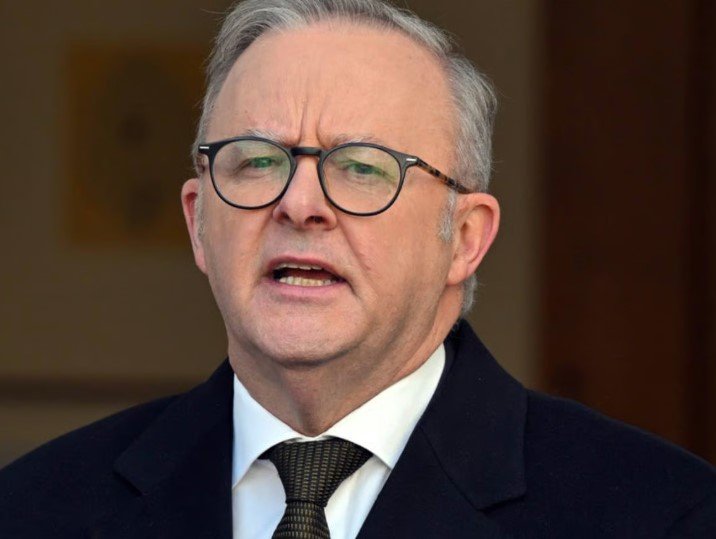Australia’s Prime Minister Anthony Albanese has accused Israel’s Benjamin Netanyahu of refusing to face the human cost of the war in Gaza, saying the Israeli leader is “in denial” as civilian suffering deepens.
The comments came just a day after Albanese confirmed Australia will support recognition of a Palestinian state at the United Nations General Assembly in September — a major diplomatic shift aligning Canberra with recent moves by the UK, France and Canada.
A Tense Call Between Leaders
Albanese revealed he had informed Netanyahu of Australia’s decision in a phone call last Thursday. It wasn’t a warm exchange.
“He again reiterated to me what he has said publicly as well,” Albanese told ABC Radio on Tuesday, “which is to be in denial about the consequences that are occurring for innocent people.”
The Australian leader said the decision wasn’t made lightly, but public opinion at home had tilted sharply. “Australians want to see the killing and the cycle of violence stop,” he said, pointing to growing frustration with Israel’s military strategy.
Netanyahu, in contrast, labelled the recognition decision by Australia and its allies “shameful” and accused them of “rewarding terrorism.”
War Pressure Mounting on Israel
For months, Israel has been under mounting diplomatic and humanitarian pressure to end the war in Gaza. Reports from aid agencies and health officials have painted a stark picture.
According to the Hamas-run health ministry, five people — including one child — died from malnutrition in the past 24 hours, bringing the total recorded malnutrition deaths to 222 since the conflict escalated last year. Of these, 101 were children.
Israel disputes the famine claims, saying no starvation exists in Gaza and accusing UN agencies of failing to collect and distribute aid at border crossings.
The UN, for its part, has pushed back. It says its teams face long delays and bureaucratic hurdles while trying to move food and medical supplies from Israeli-controlled checkpoints into Gaza.

The Aid Bottleneck Dispute
Albanese took aim at what he described as unacceptable blockages in aid delivery. “The stopping of aid that we’ve seen, and then the loss of life that we’re seeing around those aid distribution points, where people queuing for food and water are losing their lives, is just completely unacceptable,” he said.
He pointed to recent incidents where airstrikes or crossfire have hit civilians near distribution centres. Those images, shared widely in Australia, have fuelled political and public pressure on his government to act.
Some aid workers have described the Gaza border situation in almost mechanical terms — “like a traffic jam that never clears” — with convoys waiting for hours or days under scorching heat.
-
Long waits at Israeli checkpoints
-
Restrictions on truck movements into Gaza
-
Risk of attacks near distribution areas
-
Shortages of fuel for refrigeration
Israel argues that Hamas fighters often seize aid shipments, making monitoring and control necessary. UN officials counter that the longer goods sit in transit zones, the more perishable supplies spoil before reaching those in need.
Australia’s Diplomatic Shift
Australia’s support for Palestinian recognition is the most significant change in its Middle East policy in over a decade. Successive governments, both Labor and Liberal, had avoided taking a clear stance at the UN on statehood recognition, preferring to emphasise negotiations between Israel and the Palestinians.
A quick look at how Australia has voted on Palestinian recognition issues in the UN over recent years:
| Year | Australia’s Position | Outcome |
|---|---|---|
| 2012 | Abstained on Palestine’s UN observer status | Passed |
| 2014 | Voted against Palestinian accession to UN agencies | Failed |
| 2017 | Abstained on Jerusalem status vote | Passed |
| 2025 | Will vote in favour of Palestinian statehood | Pending |
While the UK and France announced similar moves earlier this year, Canberra’s decision comes at a moment when its security and trade relationships with Israel remain active, making the choice more politically sensitive.
Reaction at Home and Abroad
At home, Albanese’s decision has been praised by human rights groups but slammed by pro-Israel lobbyists.
Supporters say it puts Australia “on the right side of history” and reflects the mood of a country increasingly disturbed by graphic reports from Gaza. Critics argue it sends the wrong message to Israel at a time when Hamas still controls parts of the enclave.
Internationally, Palestinian officials have welcomed the move, calling it a “bold and principled step.” Israeli diplomats, meanwhile, have hinted there could be consequences for bilateral ties, though they’ve stopped short of detailing them.
What’s Next at the UN
The General Assembly vote in September is expected to be symbolic rather than legally binding, but it will carry political weight. Analysts say the push for recognition is less about immediate change on the ground and more about shaping the diplomatic narrative.
The move will likely deepen the rift between Israel and countries now openly challenging its war strategy. Whether it shifts the conflict’s trajectory is another question.
As one former Australian diplomat put it, “This is Canberra planting a flag in the sand. It may not change facts in Gaza tomorrow, but it changes how Australia is seen — and how it sees itself — in this conflict.”
